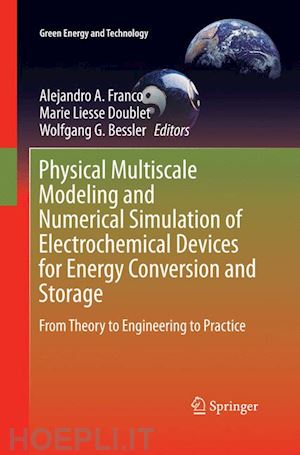
Questo prodotto usufruisce delle SPEDIZIONI GRATIS
selezionando l'opzione Corriere Veloce in fase di ordine.
Pagabile anche con Carta della cultura giovani e del merito, 18App Bonus Cultura e Carta del Docente
The aim of this book is to review innovative physical multiscale modeling methods which numerically simulate the structure and properties of electrochemical devices for energy storage and conversion. Written by world-class experts in the field, it revisits concepts, methodologies and approaches connecting ab initio with micro-, meso- and macro-scale modeling of components and cells. It also discusses the major scientific challenges of this field, such as that of lithium-ion batteries. This book demonstrates how fuel cells and batteries can be brought together to take advantage of well-established multi-scale physical modeling methodologies to advance research in this area. This book also highlights promising capabilities of such approaches for inexpensive virtual experimentation.
In recent years, electrochemical systems such as polymer electrolyte membrane fuel cells, solid oxide fuel cells, water electrolyzers, lithium-ion batteries and supercapacitors have attracted much attention due to their potential for clean energy conversion and as storage devices. This has resulted in tremendous technological progress, such as the development of new electrolytes and new engineering designs of electrode structures. However, these technologies do not yet possess all the necessary characteristics, especially in terms of cost and durability, to compete within the most attractive markets. Physical multiscale modeling approaches bridge the gap between materials’ atomistic and structural properties and the macroscopic behavior of a device. They play a crucial role in optimizing the materials and operation in real-life conditions, thereby enabling enhanced cell performance and durability at a reduced cost. This book provides a valuable resource for researchers, engineers and students interested in physical modelling, numerical simulation, electrochemistry and theoretical chemistry.











Il sito utilizza cookie ed altri strumenti di tracciamento che raccolgono informazioni dal dispositivo dell’utente. Oltre ai cookie tecnici ed analitici aggregati, strettamente necessari per il funzionamento di questo sito web, previo consenso dell’utente possono essere installati cookie di profilazione e marketing e cookie dei social media. Cliccando su “Accetto tutti i cookie” saranno attivate tutte le categorie di cookie. Per accettare solo deterninate categorie di cookie, cliccare invece su “Impostazioni cookie”. Chiudendo il banner o continuando a navigare saranno installati solo cookie tecnici. Per maggiori dettagli, consultare la Cookie Policy.